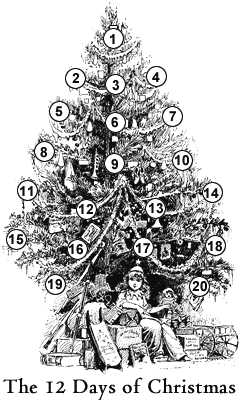Christmastide - Christmas Eve
Christmastide - Christmas Eve

An excellent introduction to the Christmas season and celebrations in the "Domestic Church" is found in the following excerpts from the Directory on Popular Piety and the Liturgy (on theVatican web site). Links to resources on our web site are provided.
Christmastide
106. During Christmastide, the Church celebrates the mystery of the Lord's manifestation: His humble birth in Bethlehem which was made known to the shepherds, the first of Israel to welcome the Savior; the Epiphany to the three wise men who had "come from the East" (Mt 2:1), the first of the Gentiles who recognized and adored Christ the Messiah in the child of Bethlehem; the theophany at the river Jordan in which the Father declares that Jesus is His "well-beloved Son" (Mt 3:17) at the outset of His messianic mission; the miracle of Cana in which Jesus "manifested His glory and His disciples believed in Him" (John 2:11).
107. In addition to these celebrations recalling the primary meaning of Christmas, there are also other celebrations closely connected with the mystery of the Lord's manifestation: the martyrdom of the Holy Innocents (December 28) whose blood was shed because of hatred for Jesus and because of Herod's rejection of His lordship; the memorial of the Holy Name of Jesus, January 13; the feast of the Holy Family (Sunday in the octave of Christmas) celebrating the holy family in which Jesus "grew in wisdom and grace before God and men" (Lk 2:52); the solemnity of January 1, which recalls the divine, virginal and salvific motherhood of the Blessed Virgin Mary; and, although outside of Christmastide, the feast of the Presentation of the Lord (February 2), celebrating the encounter between the Messiah and His people, represented by Simeon and Anna, and the prophecy of Simeon.
108. Much of the richness and complexity of the mystery of the Lord's manifestation is reflected in displays of popular piety, which is especially sensitive to the childhood of Christ which reveals His love for us. Popular piety intuitively grasps:
- the importance of the "spirituality of gift", which is proper to Christmas: "a child is born for us, a son is given to us" (cf. Is 9:5), a gift expressing the infinite love of God, who "so loved the world that He gave His only Son" (John 3:16);
- the message of solidarity conveyed by the event of Christmas: solidarity with sinful man, for whom, in Christ, God became man "for us men and for our salvation"(118); solidarity with the poor, because the Son of God "who" was rich but became poor for your sake, to make you rich out of your poverty" (II Cor 8:9);
- the sacredness of human life and the wonderful event that is every birth, since the Word of life came amongst men and was made visible through his birth of the Virgin Mary (cf. I John 1:2);
- the messianic joy and peace to which man has aspired in every age: the Angels announce the birth of the Savior of the world to the shepherds, the "Prince of Peace (Is 9:5) and proclaim "peace on earth to men of good will" (Lk 2:14);
- the spirit of simplicity and poverty, humility and trust in God, suggested by the events surrounding the birth of Christ.
Popular piety, precisely because it can intuit the values inherent in the mystery of Christ's birth, is called upon to cooperate in preserving the memory of the manifestation of the Lord, so as to ensure that the strong religious tradition surrounding Christmas is not secularized by consumerism or the infiltration of various forms of neopaganism.
Christmas Eve
109. In the space of time between the first Vespers of Christmas and Midnight Mass, both the tradition of Christmas carols, which are potent means of conveying the Christmas message of peace and joy, and popular piety propose certain forms of prayers, differing from country to country, which should be cherished and, where necessary, made consonant with the celebration of the Liturgy: These would include:
- "Live cribs" and the inauguration of the crib in the homes of the faithful which is an opportunity for family prayer: this prayer should include a reading of St. Luke's account of the birth of Christ, the typical Christmas carols, as well as prayers of petition and praise, especially those of children who are the protagonists in such family moments;
- the inauguration of the Christmas tree. This event also offers an opportunity for family prayer. Apart from its historical origins, the Christmas tree has become a potent symbol today and is very diffuse amongst Christians; it evokes both the tree planted in the center of Eden (Gen 2:9), and the tree of the Cross, which lends it a Christological significance: Christ is the true tree of life, born of human stock, of the Virgin Mary, the tree which is always green and productive. In the Nordic countries, the tree is decorated with apples and hosts. "Gifts" can be added; but among the gifts placed under the tree, something should be included for the poor since they belong to every Christian family;
- the Christmas supper. The Christian family, which traditionally blesses the table and gives thanks to the Lord for the gift of food, performs this ceremony with greater intensity at the Christmas supper, which gives potent concrete expression to the joy of family ties.
110. Where possible, the Church desires that the faithful should prepare for the celebration of Midnight Mass on December 24 with the Office of Readings. Where such is not possible, it may be opportune to arrange a vigil of hymns, readings, and elements drawn from popular piety.
111. At Midnight Mass, an event of major liturgical significance and of strong resonance in popular piety, the following could be given prominence:
- at the beginning of Mass, the proclamation of the Savior's birth according the formula contained in the Roman Martyrology could be made in song;
- the prayer of the faithful should really be universal, and where appropriate, use several languages; and the poor should always be remembered in the presentation of the gifts;
- at the end of Mass, the faithful could be invited to kiss the image of the Child Jesus, which is then placed in a crib erected in the church or somewhere nearby.
See also Christmas Eve: Blessings for Tree and Crib - Mealtime Prayers for the Christmas Season
CHRISTMAS SEASON | Christmas Readings | Christmas Hymns & Carols | Christmas Meal Prayers | Christmas Tree & Crib (Creche) ] Origin of Christmas Customs
15. And it came pass, as the angels were gone away from them into heaven, the shepherds said one to another, Let us now go even to Bethlehem, and see this thing which is come to pass, which the Lord has made known to us.
16. And they came with haste, and found Mary, and Joseph, and the babe lying in a manger.
17. And when they had seen it, they made known abroad the saying which was told them concerning this child.
18. And all they that heard it wondered at those things which were told them by the shepherds.
19. But Mary kept all these things, and pondered them in her heart.
20. And the shepherds returned, glorifying and praising God for all the things that they had heard and seen, as it was told to them.
GREEK EX. The shepherds were filled with astonishment at the things that they saw and heard, and so they left their sheepfolds, and set out by night to Bethlehem, seeking for the light of the Savior; and therefore it is said, They spoke one to another, &c.
THEOPHYL; As men who were truly watching, they said not, Let us see (the child; but) the word which has come to pass, i.e. the Word which was from the beginning, let us see how it has been made flesh for us, since this very Word is the Lord. For it follows, Which the Lord has made, and has shown to us; i.e. Let us see how the Lord has made Himself, and has shown His flesh to us.
AMBROSE; How remarkably Scripture weighs the import of each word. For when we behold the flesh of the Lord, we behold the Word, which is the Son. Let not this seem to you a slight example of faith, because of the humble character of the shepherds. For simplicity is sought for, not pride. It follows, And they came in haste. For no one indolently seeks after Christ.
ORIGEN; But because they came in haste, and not with loitering steps, it follows, They found Mary, (i.e. her who had brought Jesus into the world,) and Joseph, (i.e. the guardian of our Lord's birth,) and the babe lying in the manger, (i.e. the Savior Himself.)
THEOPHYL; It seems to succeed in due order, that after having rightly celebrated the incarnation of the Word, we should at length come to behold the actual glory of that Word. Hence it follows: But when they saw it, they made known the word which had been spoken to them.
GREEK EX. Beholding with hidden faith indeed the happy events which had been told them, and not content with marveling at the reality of those things which at the very first they saw and embraced when the Angel told them, they began to relate them not only to Mary and Joseph, but to the others also (and what is more they impressed them on their minds,) as it follows, And all who heard it marveled. For how could it be otherwise, at the sight of one of the heavenly host upon earth, and earth in peace reconciled to heaven; and that ineffable Child binding together in one, by His divinity, heavenly things, by His humanity, earthly things, and by this conjunction of Himself ejecting a wonderful union!
GLOSS. Not only do they marvel at the mystery of the incarnation, but also at so wonderful an attestation of the shepherds, men who could not have devised these unheard of things, but were with simple eloquence proclaiming the truth.
AMBROSE; Esteem not the words of the shepherds as mean and despicable For from the shepherds Mary increases her faith, as it follows: Mary kept all these sayings, and pondered them in her heart. Let us learn the chastity of the sacred Virgin in all things, who no less chaste in her words than in her body, gathered up in her heart the materials of faith.
THEOPHYL; For keeping the laws of virgin modesty, she who had known the secrets of Christ would divulge them to no one, but comparing what she had read in prophecy with what she now acknowledged to have taken place, she did not utter them with the mouth, but preserved them shut up in her heart.
GREEK EX. Whatever the Angel had said to her, whatever she had heard from Zacharias, and Elisabeth, and the shepherds, she collected them all in her mind, and comparing them together, perceived in all one harmony. Truly, He was God who was born from her.
ATHANAS. But every one rejoiced in the nativity of Christ, not with human feelings, as men are wont to rejoice when a son is born, but at the presence of Christ and the luster of the Divine light. As it follows: And the shepherds returned, glorifying and praising God for every thing they had heard, &c.
THEOPHYL; That is to say, from the Angels, and had seen, i.e. in Bethlehem, as it was told them, i.e. they glory in this, that when they came they found it even as it was told them, or as it was told them they give praise and glory to God. For this they were told by the Angels to do, not in very word commanding them, but setting before them the form of devotion when they sung glory to God in the highest.
THEOPHYL; To speak in a mystery, let the shepherds of spiritual flocks, (nay, all the faithful,) after the example of, these shepherds, go in thought even to Bethlehem, and celebrate the incarnation of Christ with due honors. Let us go indeed casting aside all fleshly lusts, with the whole desire of the mind even to the heavenly Bethlehem, (i.e. the house of the living bread,) that He whom they saw crying in the manger we may deserve to see reigning on the throne of His Father. And such bliss as this is not to be sought for with sloth and idleness, but with eagerness must we follow the footsteps of Christ. When they saw Him they knew Him; and let us haste to embrace in the fullness of our love those things which were spoken of our Savior, that when the time shall come that we shall see with perfect knowledge we may be able to comprehend them.
THEOPHYL; Again, the shepherds of the Lord's flock by contemplating the life of the fathers who went before them, (which preserved the bread of life,) enter as it were the gates of Bethlehem, and find therein none other than the virgin beauty of the Church, that is, Mary; the manly company of spiritual doctors, that is, Joseph; and the lowly coming of Christ contained in the pages of Holy Scripture, that is, the infant child Christ, laid in the manger.
ORIGEN; That was the manger which Israel knew not, according to those words of Isaiah, The ox knows his owner, and the ass his master's crib.
THEOPHYL; The shepherds did not hide in silence what they knew, because to this end have the Shepherds of the Church been ordained, that what they have learned in the Scriptures they might explain to their hearers.
THEOPHYL; The masters of the spiritual flocks also, while others sleep, at one time by contemplation enter into the heavenly places, at another time pass around them by seeking the examples of the faithful, at another time by teaching return to the public duties of the pastoral office.
THEOPHYL; Every one of us, even he who is supposed to live as a private person, exercises the office of shepherd, if, keeping together a multitude of good actions and pure thoughts, he strive to rule them with due moderation, to feed them with the food of the Scriptures, and to preserve them against the snares of the devil.
Catena Aurea Luke 2







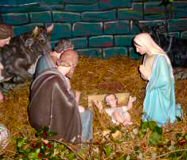 With the shepherds we hurry to the manger and adore the Incarnate Son of God, who for us and for our salvation descended upon earth. The purpose of the Christmas feast is beautifully expressed in the Preface of the Nativity: "For by the mystery of the Word made flesh the light of Thy glory hath shone anew upon the eyes of our mind; so that while we acknowledge Him a God seen by men, we may be drawn by Him to the love of things unseen."
With the shepherds we hurry to the manger and adore the Incarnate Son of God, who for us and for our salvation descended upon earth. The purpose of the Christmas feast is beautifully expressed in the Preface of the Nativity: "For by the mystery of the Word made flesh the light of Thy glory hath shone anew upon the eyes of our mind; so that while we acknowledge Him a God seen by men, we may be drawn by Him to the love of things unseen." 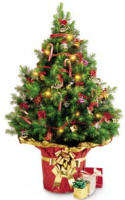 The Christmas tree, of which the first-known mention was made in 1605 at Strasbourg, was introduced into France and England in 1840. It symbolizes the great family tree of Christ which through David and Jesse has its roots in Abraham, the father of the chosen race. It is often laden with gifts to remind us that Christmas brought us the priceless gifts of grace and of eternal life. It is frequently adorned with lights that recall to us that Christ is the Light of the world enlightening those who sit in darkness and in the shadow of death.
The Christmas tree, of which the first-known mention was made in 1605 at Strasbourg, was introduced into France and England in 1840. It symbolizes the great family tree of Christ which through David and Jesse has its roots in Abraham, the father of the chosen race. It is often laden with gifts to remind us that Christmas brought us the priceless gifts of grace and of eternal life. It is frequently adorned with lights that recall to us that Christ is the Light of the world enlightening those who sit in darkness and in the shadow of death. 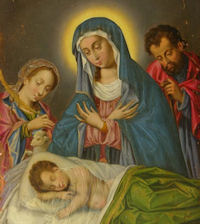 Christmas Eve and Christmas day are moments of contemplation. We consider, in many dimensions, the mystery of love that was incarnated for us. First of all, we contemplate the light and joy, without forgetting Jesus and Mary’s sorrows and sufferings, and the many difficulties that had surrounded them: the cold, the uncomfortable place, the dangers….. It would be good to accompany these thoughts by reciting and meditating slowly on the Holy Rosary, preferably in front of a crib. ‘Blessed grotto of Bethlehem that testified to the wonders! Who, in this hour would not turn our hearts? Who would not prefer the opulent palace of the King?’ (P. Guéranger, L’Anno Liturgico, Alba 1959 [orig. franc. 1841], I, p122).
Christmas Eve and Christmas day are moments of contemplation. We consider, in many dimensions, the mystery of love that was incarnated for us. First of all, we contemplate the light and joy, without forgetting Jesus and Mary’s sorrows and sufferings, and the many difficulties that had surrounded them: the cold, the uncomfortable place, the dangers….. It would be good to accompany these thoughts by reciting and meditating slowly on the Holy Rosary, preferably in front of a crib. ‘Blessed grotto of Bethlehem that testified to the wonders! Who, in this hour would not turn our hearts? Who would not prefer the opulent palace of the King?’ (P. Guéranger, L’Anno Liturgico, Alba 1959 [orig. franc. 1841], I, p122). 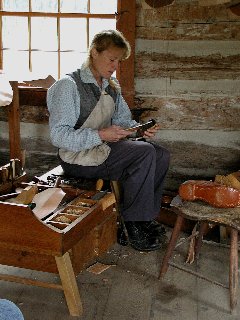
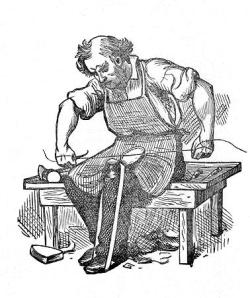

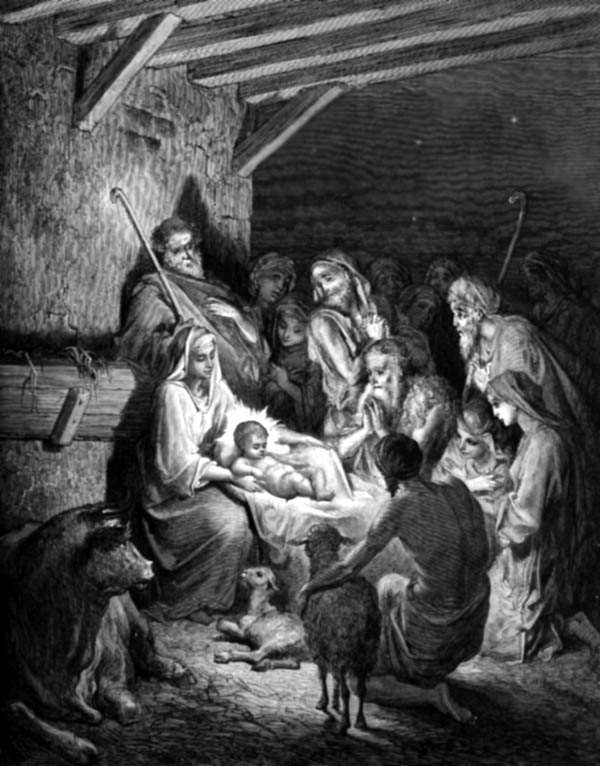

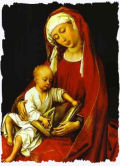 The purest of Virgins gave us our God, who was this day born of her, clothed in the flesh of a Babe, and she was found worthy to feed him at her Breast: let us all adore Christ, who came to save us.
The purest of Virgins gave us our God, who was this day born of her, clothed in the flesh of a Babe, and she was found worthy to feed him at her Breast: let us all adore Christ, who came to save us.